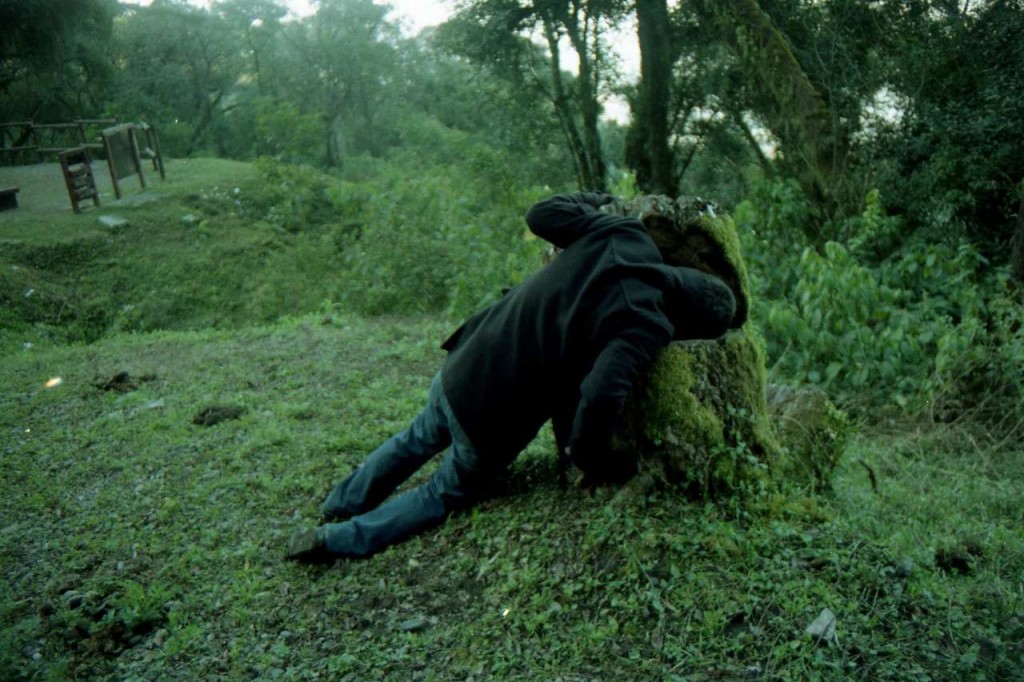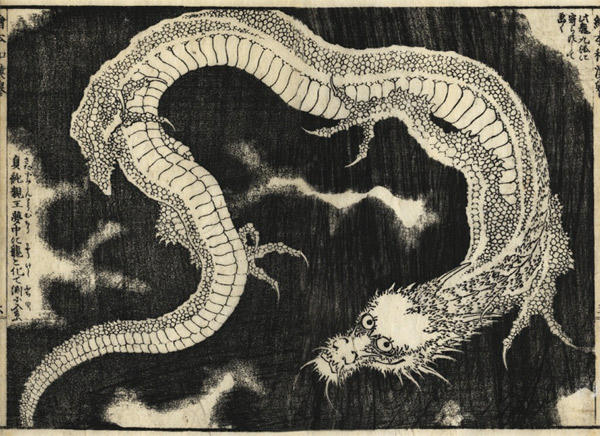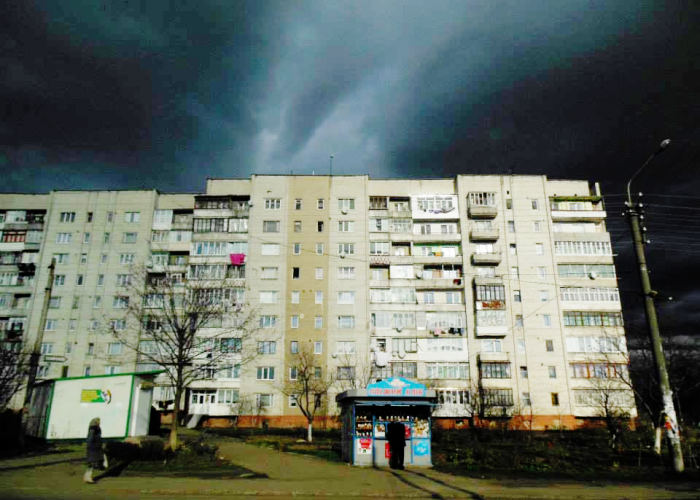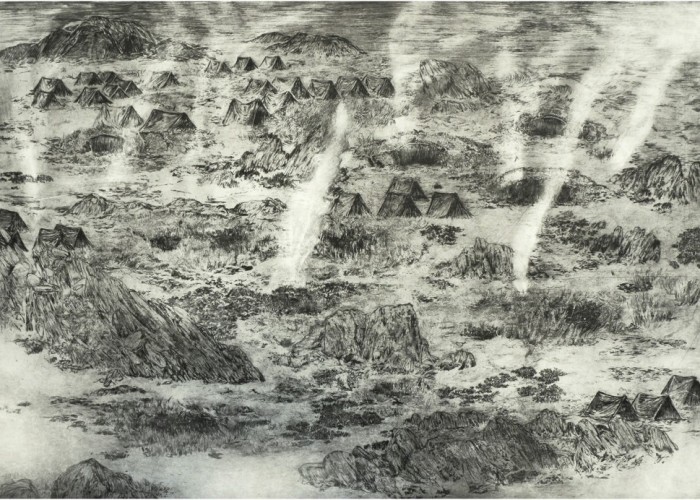Ariel Schettini
translated by John Oliver Simon
SHADE SAILS
Not poppy, nor mandragora,
nor all the drowsy syrups of the world,
Shall ever medicine thee to that sweet sleep
Which thou owed’st yesterday
Othello III.iii
When night falls I’m another woman.
Because day is something else and falls into night.
Day and night. Given and withheld.
But I might have said: when day falls,
Worn out from being day all day long,
Night comes and transforms day
Into a bitch, a beast, a ferocious rising
And day’s no longer day, it’s night.
We call that process half-shadow.
Plants no longer release oxygen and begin to emit CO2
the half-shadow attacks
like a beast in a cape, under shade sails.
I’m a chicken spider, a tarantula making webs from darkness.
Weaving all day night’s inevitability.
I stop breathing — at twilight nobody breathes — like a spider.
Give her what she wants, and there, seduced, she stops breathing.
Nervous system paralysis, they say, conscious of everything.
Don’t crack a smile but you know what’s happening.
Like a spider whose breathing nobody sees, you approach your ecstatic prey,
mute, stunned prey, fascinated by half-shadow.
And you fall on your prey like a manta ray,
______your mouth’s stinger,
fluids penetrate respiratory tract and paralyze central nervous system.
Shall I sing something? Sing La Somnámbula while I penetrate you?
I’ll sing to you like a torch-singing spider. Listen.
That’s how we’ll begin. I sing to you in darkness,
in penumbra, in auditorium
I see you and imagine myself as the spider and you the prey in my web
in the voice of my web weaving weapons of saliva backstage.
Sometimes I construct the moment like a play in an old-time theatre
where you’re the only audience and the lights go down. My voice alone
sustains and mesmerizes you, while I sing and see you with my voice,
you stop breathing.
How did Jesus become conscious of his divine nature?
Did it hit him one day? Or was it a process, say, of learning?
He slowly put the evidence together in his body. One day a miracle
the next a revelation and
finally he stood up and said, “I’m the Savior.”
Like a plant, I don’t know how it does it.
How does it reverse from puffing oxygen and sucking CO2 to doing
exactly the opposite?
Is it a molecule by molecule process? Or an everyday catastrophe
how the plant’s nervous system (nervy veins) stops producing
measurable oxygen and starts to poison?
I know I’m one girl now and under the shade sails I’m a different one,
and when you understand what my stuff is about
you’ll crawl unbreathing, mute and stunned to my paws.
As the manta ray looms over, enveloping its prey,
miraculously, it stops breathing,
as the spider goes to her mute paralyzed prey
fascinated: neither alive nor dead.
If the prey dies, it‘s no longer a tasty spider-snack.
She’ll toss the rotten carcass from her web.
It’s only that at a certain hour of twilight
in night’s half shadow,
listen,
I’m an animal.
* *
THE KISSERS
In order to prove the world does not exist, my friends
Chose a luminous noon in a restaurant in Olivos
To demonstrate with a public kiss
That lovers are the only reality in the universe.
I knew that already. I didn’t need an op-ed
Much less an empirical demonstration.
In order to prove that two lovers
Who have found something realer than reality
Are immune to customary behavior
(Manners are a pious lie
And they were playing around with history’s end)
They kissed at noon in that restaurant
Between placing our order and the arrival of food.
Anxious to get things on a different footing
I talked nervously
to curb their insistence chatting with words
about travel and the recent future and past
(I was wishing I didn’t know them)
And from their distant orb of infatuation
The kissers looked down on my mundane
shallowness and gave me up for lost
along with everything in ordinary reality
and in Olivos.
I was witness to all those kisses
From which they parted whole and unsatisfied
But as far as our fellow diners, mouths agape,
were concerned, I was an accomplice.
I knew my friends wanted to go farther and they would do it
And to the mute stupefaction of the restaurant in Olivos
they continued kissing, while I searched in the menu
for some poisoned dish
So that they
Or I or the whole restaurant
would instantly fall down dead.
* *
FOXES OF LONDON
Foxes first sought refuge here after World War II. Since then they have swapped wild rabbits and farm chickens for a diet of discarded takeout containers and other garbage food. Experts estimate there are now 16 foxes for every square mile [2.6 square kilometers] of London. (National Geographic)
Tonight I’ll wait up for the foxes.
I’ll watch from my window, with my happy meal and the camera on.
They won’t surprise me.
That’s why I came to London: well-fed cradle of socialism.
Foxes of the world, unite!
I’ll bait them with sweet cream so I can snap a photo
so that people will believe me.
Not like yesterday:
After my friends left last night the foxes came to my door.
They were fighting over garbage until I came out yelling
and they scattered like rats, escaping left and right.
Hungry, pregnant females.
And the voice of my conscience said:
My body has seen better days too.
Tomorrow I’ll give them milk.
Shy nervous starving foxes pawing through garbage.
They have no idea that tonight I’ll go out and feed them
so that they’ll know I’m a prince.
That I’m desperate also at night
Shy and nervous.
Tonight I’ll wait up for my London fox family.
With my cheap camera and my milk.
So that people will believe me.
To crown myself Prince of a nation of 80 backyards.
I’ll go off with them.
Escaping like rats.
But be sure to take out your garbage every week
because if I ever return, it’s strictly from hunger.
* *
RETURN TO ORIGIN
Today I saw a pair of chimps
returned to the jungle
as if they had a money-back guarantee.
He had acted in the circus.
She was the subject of medical experiments.
Students of linguistics, both
Knew and could combine 32 signs.
Their marriage had been celebrated
With only veterinarians to witness.
This repatriation was for services done.
Operation Return began
in the Rehabilitation Center
where, to keep safe amidst their hostile surroundings,
they were briefed about nature.
Nature: tree, fruit and predator.
Its opposite: rope, trainer, reward.
She accepted the new environment out of docility
(or its opposite)
He on the other hand didn’t want to get his feet muddy
Walking barefoot.
When they came to the sidewalk’s end they seemed to confront
a wall,
instead of a National Park.
And they learned that food no longer came in boxes.
Maybe the hardest thing was
the distinction between “return to the wild” and “exile”
which the couple had a tough time grasping
and the program didn’t go any deeper
because Animal Planet is aimed at children
And apes, no matter how old, are like children.
Finally the day came
when they said goodbye to their keepers.
She with kisses and he with an applause.
They said goodbye to the end of culture.
And reluctantly, they walked to the jungle
Returning to where they were born
Like old folks on their way to Florida.
When she saw the trees she ran to meet them
As if she remembered at last
And finally the circle was closing.
They had gotten to what we all want:
Freedom.
They performed this last dream
Just as they had been trained and untrained, did it perfectly.
Halfway there, he turned his head
to estimate the distance from jungle to Center.
His wife went on but he lagged a few steps behind,
And then
He gazed a long while at the African sunset
as if he could look at clouds from both sides now
and was lost in their depths.
* *
Image: Sofia Flores Blasco
[ + bar ]
Dragon in Clouds
Juan Carlos Mondragón translated by Leah Leone
Until the middle of the afternoon of the day before yesterday, I thought I had a good angle for the article I... Read More »
Ukrainian Tales of Buenos Aires
Stanley Bill
In the late 1920s somebody shot and killed a Ukrainian railway worker named Mykhaylo Marusiak on a street in Buenos Aires. The date is unknown. The... Read More »
Zweifel
Martín Gambarotta Übersetzt von Timo Berger
Hier ist das Wasser anders, die Schuppenblätter
der Artischocken sind anders, alles ist
im Wesentlichen anders
aber der, der eine Flasche aus dem Kühlschrank fischt
und sie... Read More »
After Kenneth Goldsmith: an interview
Michael Romano and Kenneth Goldsmith
I.
I have a bunch of questions but they’re still pretty disorganized in my mind.
So let’s just shoot.... Read More »








 sending...
sending...